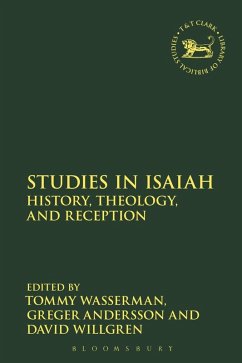The Book of Isaiah is considered one of the greatest prophetic works in the Hebrew Bible/Old Testament. The complex history of the book's composition, over several time periods, can often perplex and enthrall. The editors to this volume encourage readers to engage deeply with the text in order to get a grasp of the traces and signs within it that can be seen to point to the book's process of composition and ongoing reinterpretation over time. The contributions discuss suggested segments of composition and levels of interpretation, both within the book of Isaiah and its history of reception.
The book is divided into two sections: in the first part certain motifs that have come to Isaiah from a distant past are traced through to their origins. Arguments for a suggested 'Josianic edition' are carefully evaluated, and the relationship between the second part of Isaiah and the Book of Psalms is discussed, as are the motifs of election and the themes of Zion theology and the temple. The second part of the book focuses on the history of reception and looks at Paul's use of the book of Isaiah, and how the book is used, and perhaps misused in a contemporary setting in the growing churches in Africa. With a range of international specialists, including Hugh Williamson, Tommy Wasserman, and Knut Holter, this is an excellent resource for scholars seeking to understand Isaiah in a greater depth.
The book is divided into two sections: in the first part certain motifs that have come to Isaiah from a distant past are traced through to their origins. Arguments for a suggested 'Josianic edition' are carefully evaluated, and the relationship between the second part of Isaiah and the Book of Psalms is discussed, as are the motifs of election and the themes of Zion theology and the temple. The second part of the book focuses on the history of reception and looks at Paul's use of the book of Isaiah, and how the book is used, and perhaps misused in a contemporary setting in the growing churches in Africa. With a range of international specialists, including Hugh Williamson, Tommy Wasserman, and Knut Holter, this is an excellent resource for scholars seeking to understand Isaiah in a greater depth.


